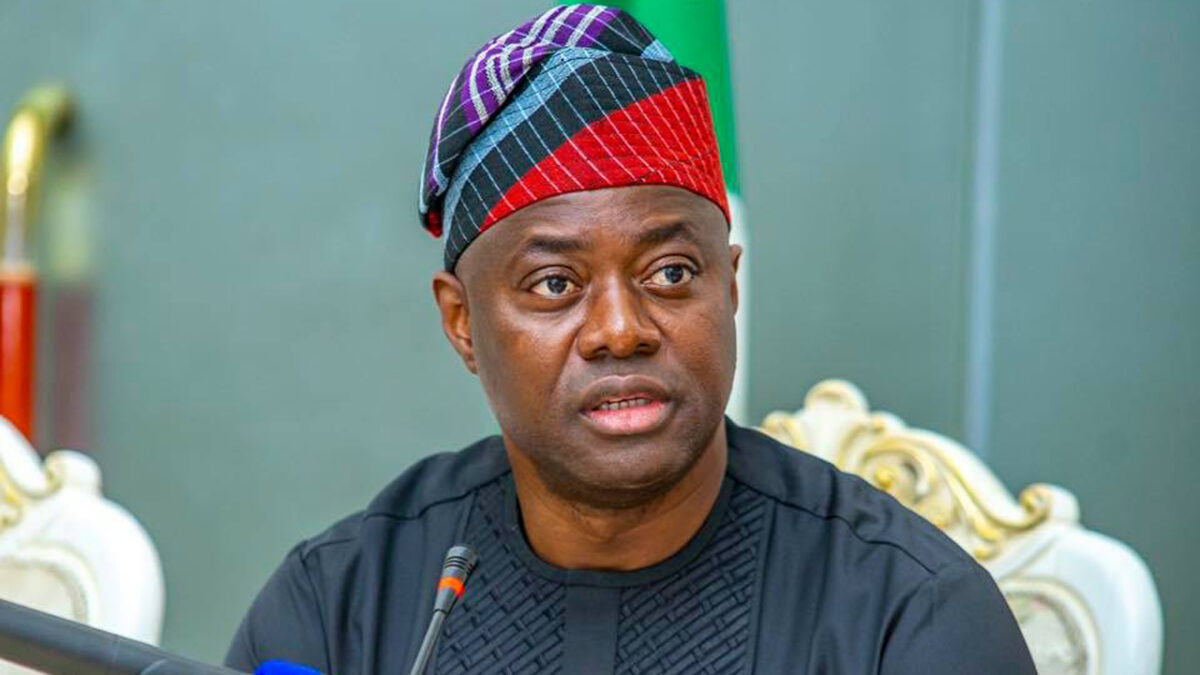For his unlawful act, the apex court awarded ₦20 million cost against Makinde in favor of the sacked LG officials.
News Agency of Nigeria
Governor Seyi Makinde of Oyo State has sought a review of a judgment of the Supreme Court to pay the salaries and allowances of local government chairmen and councilors he sacked upon assuming office on May 29, 2019.
Makinde, in a fresh motion and notice of appeal before the Appeal Court, Abuja, urged the court to reverse the order.
The News Agency of Nigeria (NAN) reports that the government filed the applications along with the Oyo State Attorney General and five others.
In both fillings, Makinde and other applicants want the appellate court to, among others, reverse the orders of April 27 made by Justice A. O. Ebong of a High Court of the Federal Capital Territory (FCT) in furtherance of the Supreme Court judgment given on May 7, 2021, in the appeal marked: SC.CV/556/2021.
NAN reports that the ex-LG officials, led by Bashorun Mojeed Ajuwan, successfully challenged their sacked-up to the Supreme Court.
In a judgment, the apex court had, on May 7, 2021, declared Makinde’s sack of the council officials less than 19 months into their three-year tenure as unlawful.
In the judgment, the Supreme Court ordered that the salaries and allowances that “they (the sacked LG officials) were each entitled to, be paid for the balance of the period from 29th May 2019 (when Makinde sacked them) ending on 11th May 2032 when the respective tenures they were elected for would end.”
The apex court added that the 1st defendant/respondent (Makinde) “shall forthwith, pay the said salaries and allowances of the claimants/appellants as ordered.”
For his unlawful act, the apex court awarded ₦20 million cost against Makinde in favor of the sacked LG officials.
It further ordered the state’s AG to file “on or before 7th August, 2021 an affidavit (under the hand of the incumbent of the office) attesting to the payment of the said salaries and allowances” as ordered by the court in its judgment.
Reacting to Makinde’s renewed motion and notice of appeal, Ajuwon and other sacked LG officials accused the governor of a ploy to undermine the Supreme Court judgment.
They claimed that Makinde’s decision to approach to Appeal Court was aimed at sustaining his alleged vow not to comply with the apex court judgment, except for the sacked LG officials, who are members of the All Progressives Congress (APC) decamp to his party, the Peoples Democratic Party (PDP).
Makinde had, following the Supreme Court judgment, agreed to pay the unlawfully sacked LG officials a total of ₦4,874,889,425.60 (about ₦4.9 billion), out of which it paid only ₦1.5 million in 2022, leaving ₦3,374,889,425.60 (about ₦3.4 billion) outstanding.
Instead of paying the outstanding judgment debt of ₦3.4b, he applied to the High Court of the FCT in a motion he filed on April 3, praying to be allowed to pay the outstanding judgment debt in installments of N300m every six months, a proposal Ajuwon and the other judgment creditors objected to.
However, in a ruling on April 27, Justice Ebong granted Makinde’s prayer to pay in installments but varied his payment plan because it would take him six years to fully defray the debt if allowed to pay the way he proposed.
Justice Ebong said: “That does not appear reasonable to me given the current Nigerian economic situation, characterised by dwindling resources and high inflation.
“There is every reason to believe that the value of the judgment debt would be substantially lost to inflation if left to be paid over a six-year period as proposed by the applicants (Makinde, the AG, and others officials of the state).
“To compound the unfairness of the proposed terms, the applicants (Makinde and others) have not explained to this court why they moved away from their commitment in Exhibit BOS1 to pay off the outstanding judgment sum within six months from 23th December 2021.”
Justice Ebong proceeded to order one of Oyo State’s bankers, First Bank of Nigeria, to immediately pay Ajuwon and others ₦1,374,889,425.60 (about ₦1.4 billion) and to pay the remaining balance of ₦2 billion in an installment of ₦500 million every six months, with the first installment payable on July 31, 2023.
It is this ruling that Makinde has appealed against and applied to stay in a notice of appeal and motion on notice filed recently before the Court of Appeal in Abuja.
In the motion, he is praying for the appellate court to, among others, stay the execution of the judgment pending the determination of the appeal.
In the notice of appeal, Makinde wants the court to reverse the ruling, arguing that the state has no resources to pay as ordered by the court.
He stated that Oyo State would be unable to meet its obligations should the order be executed as made.
But, in their counter-affidavit to the motion by Makinde, Ajuwon, and others, who also filed a cross-appeal, faulted the governor’s claim, stating that the Oyo State can pay the debt, having not shown by credible documentary evidence that it was bankrupt.
They added that Makinde “had vowed not to pay us (the judgment creditors) our outstanding entitlements as long as he remains the Governor of Oyo State, because we did not cross to his political party.
“The appellants/applicants (Makinde and others) are blowing hot and cold at the same time, because while, in their notice of appeal, they are contending that the judgment sum is not ascertainable, in another breath, and by this application, they are praying to pay the outstanding judgment sum of ₦3,374,889,425,60 on an installment basis of ₦300 million every six months.
“The appellants/applicants have consistently showed by their conduct that they do not have any iota of respect for the entire judiciary. In fact, the apex court, in its judgment delivered in our favour on 7th May, 2021, condemned this attitude of lack of respect for the judiciary by the appellants/applicants.”
The court of appeal has fixed June 8 for a hearing in the appeal.
Related posts
Damson Idris Mourns Baba Suwe
Speaker Of Taraba House Of Assembly Resigns
Reviews
Follow Our Activities On Facebook
1 hour ago
1 hour ago
3 hours ago
6 hours ago
23 hours ago
SUBSCRIBE
[mc4wp_form id=”2012″]
Top Reads!
#BigBrotherNaija “Level Up” Week 6
Though last Sunday Sunday was meant to be a “no-eviction” day, it came as a shocker when fake housemate, Modella…
Dating in 2022; Situationships Are Not For The Fainthearted
Situationships are defined as that space between a defined relationship and something other than a friendship. It is a romantic…
20 Questions With Dinta Media’s Visual Storyteller, Chimeremogo Nwoke
Dinta Media is not really just a media production brand but we like to see ourselves as a hub for…
How Are Nigeria’s Small Businesses Coping?
The current rising rate of inflation and other burdens against the Nigerian economy speaks to the realities of the times.
Thrifting Is All The Rave Now, Here’s Why
By Amy Adindu The affordable clothing movement has gained global attention and acceptance as we’re all trying to look like…
#BigBrotherNaija “Level Up” Week 2
Week 2 of the highly watched Nigerian TV show kicked off with an early plot twist. On Sunday, Big Brother…
#BlueTunes: Burna Boy, Omah Lay Top Album Picks For July
July was a promising month for music lovers; from Lizzo’s album titled Special and Imagine Dragons’ Mercury, (Acts 1 &…
#BlueTunes Album Picks For June
Gbagada Express – Boj Bolaji Odojukan, popularly known as BOJ, was raised both in England and Nigeria. He shot to…
“A Creative’s Dream” with Jeff Chinonso
On the 26th of June 2022, Jeff Chinonso hosted his first solo art exhibition. The Augmented Reality exhibition themed “A…
Nigerian API-based company Thepeer raises $2.1 million
Tech infrastructure startup Thepeer has raised a $2.1 million seed round according to a report from TechCabal. Thepeer, a Nigerian…
Dika Ofoma, Ugochukwu Onuoha take on grief in Debut Film “The Way Things Happen”
The twenty-minute film focuses on the loss of a loved one, and how grief changes a person.
Nigerian Startups might just be Crippled by a Recently Leaked bill
Over the years there has been talks of amendment on the 2007 Act of the National Information & Technology Agency (NITDA).
Why We Love Kelechi Amadi Obi
The definition of talent is Kelechi Amadi’s iconic story. Imagine a person who studies law in school, gets called to Bar, and leaves it all for something different and unrelated…Painting!

















